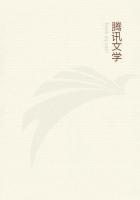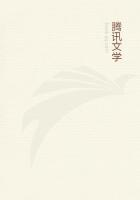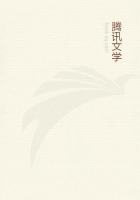The obnoxious objects stood some hundred yards away from the speaker, who waved toward them with his ax; and there was something suggestive in the comparison. That coast, to begin with, stretching toward the sunset, was itself almost as fantastic as a sunset cloud.
It was cut out against the emerald or indigo of the sea in graven horns and crescents that might be the cast or mold of some such crested serpents; and, beneath, was pierced and fretted by caves and crevices, as if by the boring of some such titanic worms.
Over and above this draconian architecture of the earth a veil of gray woods hung thinner like a vapor; woods which the witchcraft of the sea had, as usual, both blighted and blown out of shape.
To the right the trees trailed along the sea front in a single line, each drawn out in thin wild lines like a caricature. At the other end of their extent they multiplied into a huddle of hunchbacked trees, a wood spreading toward a projecting part of the high coast.
It was here that the sight appeared to which so many eyes and minds seemed to be almost automatically turning.
Out of the middle of this low, and more or less level wood, rose three separate stems that shot up and soared into the sky like a lighthouse out of the waves or a church spire out of the village roofs.
They formed a clump of three columns close together, which might well be the mere bifurcation, or rather trifurcation, of one tree, the lower part being lost or sunken in the thick wood around.
Everything about them suggested something stranger and more southern than anything even in that last peninsula of Britain which pushes out farthest toward Spain and Africa and the southern stars.
Their leathery leafage had sprouted in advance of the faint mist of yellow-green around them, and it was of another and less natural green, tinged with blue, like the colors of a kingfisher.
But one might fancy it the scales of some three-headed dragon towering over a herd of huddled and fleeing cattle.
"I am exceedingly sorry your girl is so unwell," said Vane shortly.
"But really--" and he strode down the steep road with plunging strides.
The boat was already secured to the little stone jetty, and the boatman, a younger shadow of the woodcutter-- and, indeed, a nephew of that useful malcontent--saluted his territorial lord with the sullen formality of the family.
The Squire acknowledged it casually and had soon forgotten all such things in shaking hands with the visitor who had just come ashore.
The visitor was a long, loose man, very lean to be so young, whose long, fine features seemed wholly fitted together of bone and nerve, and seemed somehow to contrast with his hair, that showed in vivid yellow patches upon his hollow temples under the brim of his white holiday hat. He was carefully dressed in exquisite taste, though he had come straight from a considerable sea voyage; and he carried something in his hand which in his long European travels, and even longer European visits, he had almost forgotten to call a gripsack.
Mr. Cyprian Paynter was an American who lived in Italy. There was a good deal more to be said about him, for he was a very acute and cultivated gentleman; but those two facts would, perhaps, cover most of the others. Storing his mind like a museum with the wonder of the Old World, but all lit up as by a window with the wonder of the New, he had fallen heir to some thing of the unique critical position of Ruskin or Pater, and was further famous as a discoverer of minor poets. He was a judicious discoverer, and he did not turn all his minor poets into major prophets.
If his geese were swans, they were not all Swans of Avon. He had even incurred the deadly suspicion of classicism by differing from his young friends, the Punctuist Poets, when they produced versification consisting exclusively of commas and colons.
He had a more humane sympathy with the modern flame kindled from the embers of Celtic mythology, and it was in reality the recent appearance of a Cornish poet, a sort of parallel to the new Irish poets, which had brought him on this occasion to Cornwall. He was, indeed, far too well-mannered to allow a host to guess that any pleasure was being sought outside his own hospitality.
He had a long standing invitation from Vane, whom he had met in Cyprus in the latter's days of undiplomatic diplomacy; and Vane was not aware that relations had only been thus renewed after the critic had read Merlin and Other Verses, by a new writer named John Treherne. Nor did the Squire even begin to realize the much more diplomatic diplomacy by which he had been induced to invite the local bard to lunch on the very day of the American critic's arrival.
Mr. Paynter was still standing with his gripsack, gazing in a trance of true admiration at the hollowed crags, topped by the gray, grotesque wood, and crested finally by the three fantastic trees.
"It is like being shipwrecked on the coast of fairyland," he said, "I hope you haven't been shipwrecked much," replied his host, smiling.
"I fancy Jake here can look after you very well."
Mr. Paynter looked across at the boatman and smiled also.
"I am afraid," he said, "our friend is not quite so enthusiastic for this landscape as I am."
"Oh, the trees, I suppose!" said the Squire wearily.
The boatman was by normal trade a fisherman; but as his house, built of black tarred timber, stood right on the foreshore a few yards from the pier, he was employed in such cases as a sort of ferryman.
He was a big, black-browed youth generally silent, but something seemed now to sting him into speech.
"Well, sir," he said, "everybody knows it's not natural.
Everybody knows the sea blights trees and beats them under, when they're only just trees. These things thrive like some unholy great seaweed that don't belong to the land at all.
It's like the--the blessed sea serpent got on shore, Squire, and eating everything up."
"There is some stupid legend," said Squire Vane gruffly.
"But come up into the garden; I want to introduce you to my daughter."














